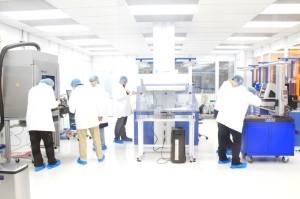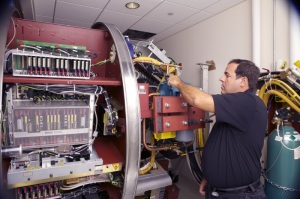Comparing the value propositions of multi-vendor and ISO service
por John R. Fischer, Senior Reporter | August 27, 2018
Parts And Service

Richardson Healthcare supports ISOs
with high value components that
represent significant cost savings for
imaging service providers -
as seen here in their CT Tube
manufacturing facility
with high value components that
represent significant cost savings for
imaging service providers -
as seen here in their CT Tube
manufacturing facility
From the August 2018 issue of HealthCare Business News magazine
Flashback to the 1990s and you would find imaging providers paying upward of $180,000 annually for MR service contracts without batting an eye. In the hands of OEM multi-vendor service divisions, these contracts could be reduced to the tune of approximately $150,000.
Today, the costs of these service agreements have plummeted, with MVS divisions putting out margins of $60-$70,000 in order to make themselves viable for hospitals, networks, and clinics struggling to stay afloat on constrained budgets and declining reimbursements.
These financial challenges have had a direct impact on the consolidation of third-party providers, who have spent the last several years merging with or acquiring one another to grow their footprint and remain competitive with the OEMs by being able to service multiple modalities made by various manufacturers.
For OEMs and third-parties alike, success in the medical equipment service market means being able to accommodate providers with a high level of flexibility and a competitive range of expertise.
“We need to be prepared to respond to those market changes and adapt and do whatever we need to do to have a real strong presence there,” John Barbati, senior director in service business management at Siemens Healthineers, responsible for enterprise services, told HealthCare Business News.
The main instigators behind these changes within the MVS and ISO communities, however, are the end users themselves, who in the face of financial hardships have been forced to reassess the types of services they require on the limited resources at their disposal.
The make versus buy debate
Today very few providers are 100 percent in-house and 100 percent outsource, but instead a mixture of both.
“It’s typically a blend of those things that offer the best price quality and overall service solution,” Steve Inacker, president and COO of Avante Health Solutions, said. “You’re starting to see many more institutions start to evaluate that make versus buy decision, or even potentially shift from more in-house to more outsource and vice-versa depending on what they have as their current mix today.”
Flashback to the 1990s and you would find imaging providers paying upward of $180,000 annually for MR service contracts without batting an eye. In the hands of OEM multi-vendor service divisions, these contracts could be reduced to the tune of approximately $150,000.
Today, the costs of these service agreements have plummeted, with MVS divisions putting out margins of $60-$70,000 in order to make themselves viable for hospitals, networks, and clinics struggling to stay afloat on constrained budgets and declining reimbursements.
These financial challenges have had a direct impact on the consolidation of third-party providers, who have spent the last several years merging with or acquiring one another to grow their footprint and remain competitive with the OEMs by being able to service multiple modalities made by various manufacturers.
For OEMs and third-parties alike, success in the medical equipment service market means being able to accommodate providers with a high level of flexibility and a competitive range of expertise.
“We need to be prepared to respond to those market changes and adapt and do whatever we need to do to have a real strong presence there,” John Barbati, senior director in service business management at Siemens Healthineers, responsible for enterprise services, told HealthCare Business News.
The main instigators behind these changes within the MVS and ISO communities, however, are the end users themselves, who in the face of financial hardships have been forced to reassess the types of services they require on the limited resources at their disposal.
The playing field between ISOs and MVS' is beginning to
level according to Inacker who foresees equal access
on the horizon between the two for performing
full services on all pieces of equipment.
level according to Inacker who foresees equal access
on the horizon between the two for performing
full services on all pieces of equipment.
Today very few providers are 100 percent in-house and 100 percent outsource, but instead a mixture of both.
“It’s typically a blend of those things that offer the best price quality and overall service solution,” Steve Inacker, president and COO of Avante Health Solutions, said. “You’re starting to see many more institutions start to evaluate that make versus buy decision, or even potentially shift from more in-house to more outsource and vice-versa depending on what they have as their current mix today.”
You Must Be Logged In To Post A CommentRegistroRegistrarse es Gratis y Fácil. Disfruta de los beneficios del Mercado de Equipos Médicos Nuevos y Usados líder en el mundo. ¡Regístrate ahora! |
|
















